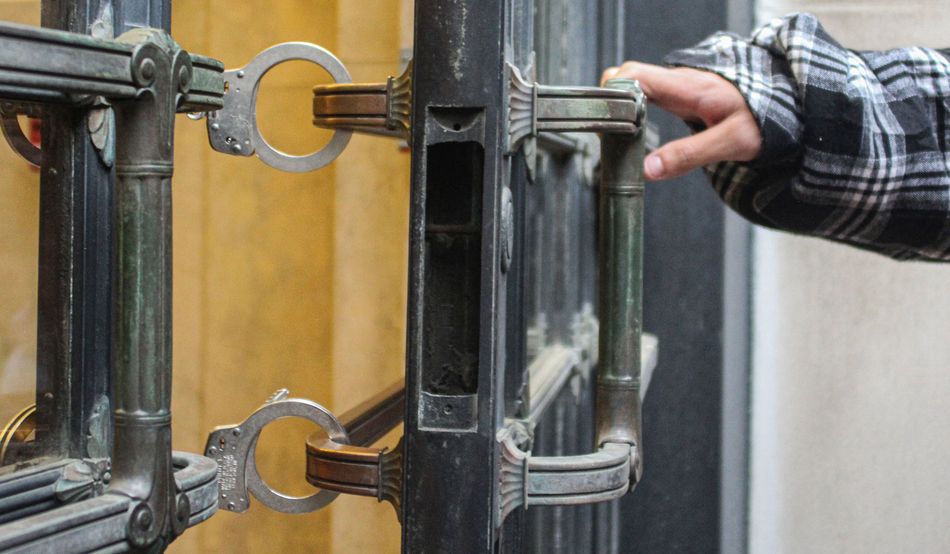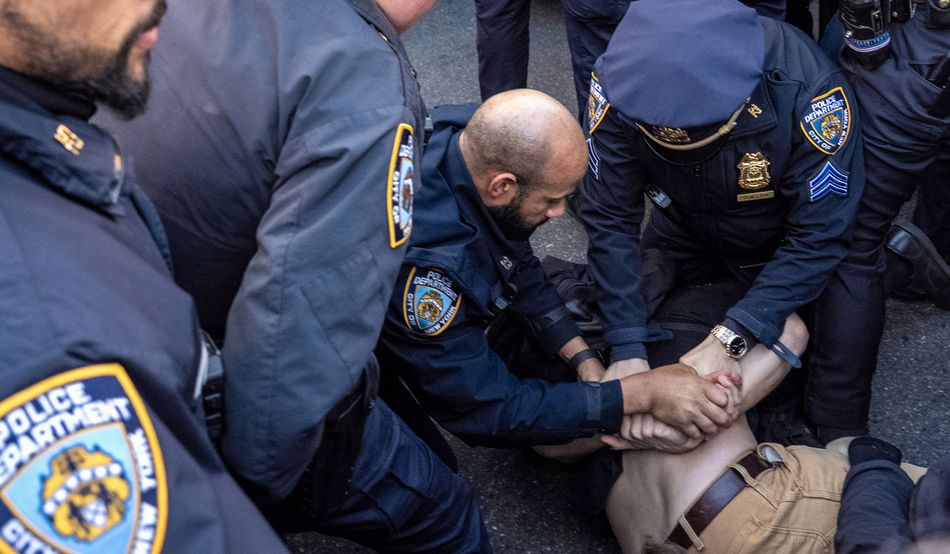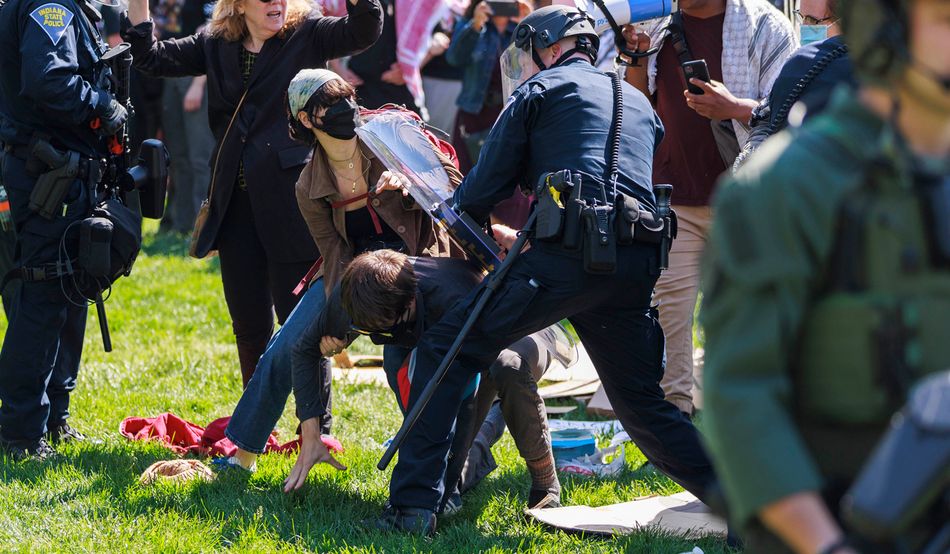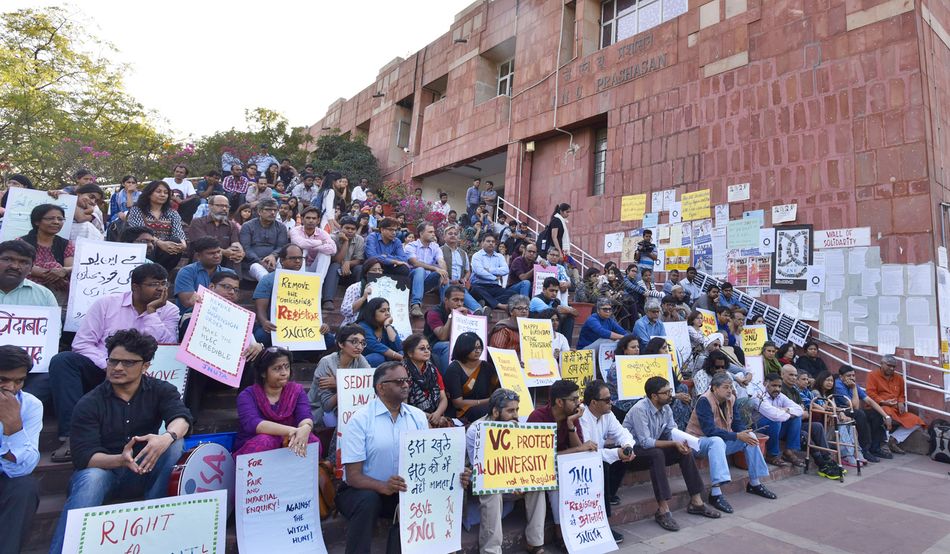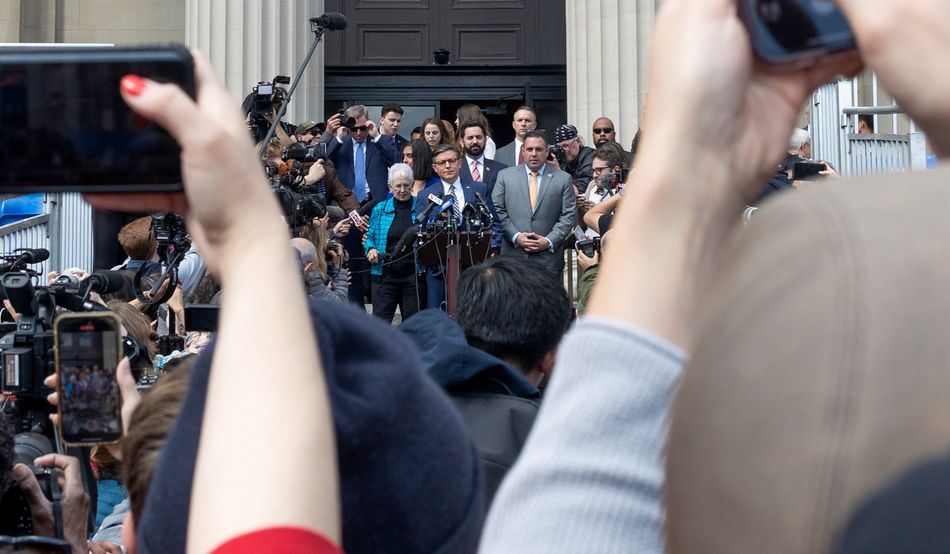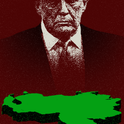On the evening of 7th May 2025, three New York Police Department (NYPD) helicopters were hovering over Columbia University’s Morningside Heights campus in upper Manhattan. Police vans arrived soon after; uniformed officers surrounded the area and barricaded streets. Earlier in the day, shortly after 3pm, about 100 student protesters had entered the main reading room of the Butler Library, a chandeliered, high-ceilinged hall right behind the colonnaded façade of the neoclassical building at the heart of the campus. Once inside, they climbed on the desks and raised through their megaphones booming chants in support of Palestine.
Two hours later, at around 5pm, the university deployed dozens of public safety officers, part of Columbia’s private safety apparatus; they blocked the entry to the library, locked its main door from inside and secured it with handcuffs. They manhandled the protesters, dragging one down the stairs and through the hallway. According to Columbia Daily Spectator, the newspaper run by student journalists: “At least six Public Safety officers pinned him to the ground.” When the protesters tried to leave, the officers told them they would have to swipe their IDs before leaving. At this some of the protesters reportedly laughed.
Claire Shipman, acting president of Columbia, announced in an email to staff and faculty that she had “taken the necessary step of requesting the presence of NYPD to assist in securing the building and the safety of our community... Columbia strongly condemns violence on our campus, antisemitism and all forms of hate and discrimination, some of which we witnessed today.”
Fifteen minutes later, New York City’s Democratic mayor, Eric Adams, wrote on X: “At the written request of Columbia University, the NYPD is entering the campus to remove individuals who are trespassing. We will not tolerate hate or violence in any form in our city.” Riot-geared officers of the NYPD’s Strategic Response Group, the unit responsible for containing protests, entered the Butler Library and arrested around 80 students, stuffed them by the dozen into police vans and took them to police headquarters. Two were served summons; everyone else got a court appearance date.
The students had good reason to be suspicious of disclosing their identities to the university, which had decided to view the protests as “violence” and criticism of Israel as “antisemitism”. The administration had weaponised all its resources, from disciplinary hearings to suspensions to dorm eviction notices, against dissenting voices on the campus. Police sirens droning about the campuses of Columbia and its affiliate colleges have become depressingly commonplace. This was the fourth time in the last 13 months that the NYPD had been called to the campus by the university administration to arrest student protesters. Their threatening presence in Morningside Heights has, however, been near constant since 7th October 2023, when militants of Hamas and Islamic Jihad broke through the border fence that separates Israel from Gaza, attacked Israel’s military outposts and towns near the border, killed nearly 1,200 people and took more than 250 hostages back with them.
The administration of Donald Trump, in office since January this year, has unleashed a new threat of detention and deportation for the protesting students. On 8th March, muscular agents of Immigration and Customs Enforcement (ICE) arrested Mahmoud Khalil, a Palestinian graduate student at Columbia, who had helped lead the student protests. They took him from his university accommodation without presenting any charges or a warrant of arrest. They threatened to arrest his pregnant wife on the spot for asking questions.
Khalil had committed no crimes, and was a lawful permanent resident. The arrest came after Marco Rubio, the secretary of state, invoked an obscure federal statute that gives him the sole authority to determine if someone’s presence in the country “compromises a compelling United States foreign policy interest”.
The White House issued a statement, using Hebrew: “SHALOM, MAHMOUD.” President Trump said on X that ICE had “proudly apprehended and detained Mahmoud Khalil, a Radical Foreign Pro-Hamas Student on the campus of @Columbia University. This is the first arrest of many to come”.
The university responded, in a display of stunning cowardice, with the equivalent of an institutional shrug. “I understand the distress that many of you are feeling about the presence of US Immigration and Customs Enforcement (ICE) agents in the streets around campus,” Katrina Armstrong, Shipman’s predecessor as acting president, wrote in an email to the Columbia community. “I feel it too and am working with our team to manage the response.”
That protests have continued at Columbia and elsewhere despite such barefaced repression is a testament to the courage of the students
Armstrong made no mention in her email of Khalil or his arrest; the university offered no aid to a student abducted from its campus by agents of an authoritarian, right-wing government. When Jewish students, who have represented a significant portion of the protesters from the beginning, chained themselves to the university gates to protest Khalil’s detention, public safety officers arrived with bolt cutters and dragged them off campus; this was being done under the banner of curbing antisemitism.
Trump’s warning was realised. ICE agents arrested students from Georgetown University, Tufts University, the University of Minnesota and Cornell. Several others were deported from various airports. By the end of April, more than 1,100 international students had their visa status changed or revoked at 174 colleges and universities nationwide. The State Department has issued an order to pause US embassies from scheduling new student visa interviews for incoming students. While some of the others who were arrested have been released, Khalil, at the time of writing, remains imprisoned in Louisiana at an ICE detention facility.
That protests have continued at Columbia and elsewhere despite such barefaced repression is a testament to the courage of the students. They have been treated with mockery and disdain by both major political parties and the national media; doxed by pro-Israeli interest groups; suspended by their schools; abandoned by the university administration; assaulted by the NYPD; and are now in the sights of an autocratic government that wants to arrest, imprison and deport them. Sixty-one of the approximately 80 students arrested at the Butler Library on 7th May were women, most of whom were undergraduates. While they were still in detention in downtown Manhattan, Rubio announced on X: “We are reviewing the visa status of the trespassers and vandals who took over Columbia University’s library.”
While playing the bully against the students, Columbia also bent its knee before the government. Almost two weeks after Khalil’s arrest, on 21st March, the university promptly gave in to the exhaustive list of demands set in front of it by the Trump administration: a further crackdown on student protesters; a dismantling of the university judicial board; adherence to a definition of antisemitism that conflates criticism of Israel with hatred of Jews; and the gutting of Columbia’s Department of Middle East, South Asian and African Studies, where Edward Said had taught for 40 years, and which was decried for decades as “Birzeit on the Hudson” by campus orientalists, a comparison to a university in the West Bank. The government had threatened to slash $400m in funding to Columbia if it failed to meet these demands. Despite a $14.8bn endowment and a wide array of legal options available, Columbia chose to submit to the blackmail.
Columbia’s capitulation has come to look particularly egregious after Harvard, threatened by the Trump administration with over $2bn worth of cuts in federal funding shortly after, chose to take the government to court. In turn, the Department of Homeland Security has terminated Harvard’s certification to enrol international students, and Harvard is now suing the DHS.
“Most people who do math, they’re fairly apolitical,” Peter Woit, who started teaching at Columbia’s Department of Mathematics in 1989, told me. In March this year, Woit started posting regular updates from the campus on his blog, titled “Not Even Wrong”, which is usually concerned with topics in physics and maths.
Just after Columbia submitted to the demands of the Trump administration, Woit wrote: “The only communications I’ve gotten from anyone this weekend have been the President’s [Katrina Armstrong] announcement of the cave-in and an email from the Trustees supporting ‘her principled and courageous leadership’. This is outrageous. As Fascism takes over US institutions, the one thing I’m seeing almost nowhere is principled or courageous resistance.”
Even in May, when I met him in his office on campus, he sounded distressed. “I still don’t really understand why the university agreed to give in to these demands. Why did they not go to court?”
Until the university’s submission to Trump, Woit told me, he was fairly sympathetic to Columbia’s administration and even the trustees, though he did not agree with everything they were doing on the campus.
“They were in a very, very difficult position,” he said. “They had these large groups of people who were very upset and trying to chant the most annoying things they could think of. And they had other counter-demonstrators who really wanted to hurt them. You had press and cameras all over the place. You had helicopters above. You had people coming from outside the city to stand in front of our gates and try and cause trouble. It was just a huge mess. It’s very hard to deal with. So, I actually had a lot of sympathy for anyone in that position.
“But once this group of people for whatever reason decided, well, we’re just going to go along with this dictator…Yeah, at that exact point, I completely lost sympathy for them.”
It was the wish of many at Columbia to go along. Pro-Israel faculty members and alumni had been lobbying since February to take the same measures pre-emptively. Ester Fuchs, a professor at the School of International and Public Affairs who is also one of the chairs of the university’s antisemitism taskforce sounded pleased when, speaking about Columbia’s acceptance of Trump’s demands, she told the New York Times: “What’s fascinating to me is a lot of these are things we needed to get done and were getting done, but now we’ve gotten done more quickly.” There were instances of real antisemitism in and around the campus, and the university constituted a taskforce Fuchs chaired to specifically deal with the problem; Islamophobia, on the other hand, continued to bloom unchecked.
Over at Harvard, much of this had been achieved before the university stood up to Trump. Some faculty members, alumni and trustees had pushed the university to adopt the International Holocaust Remembrance Alliance (IHRA) definition of antisemitism, which detractors say has long been used to wrongly label criticism of Israel as antisemitic, a day after Trump took oath of office. After a campaign led by economist and former Harvard president Larry Summers, the Harvard School of Public Health suspended its partnership with the actual Birzeit University for alleged “ties to Hamas”. A week after Columbia folded, the directors of the Harvard Center for Middle Eastern Studies were forced to resign for hosting panels such as “Israel’s War on Lebanon”. Trump asked for none of that.
Over the past four months, there have been rising calls in the American press about the country’s descent into authoritarianism. But Trump alone can’t explain the crisis at American universities, which had been in disarray for 15 months before he moved back to the White House.
“I think it is the logical extension and conclusion of the political response to the protest movement that we had while Biden was still president,” Joseph Howley, a professor at Columbia in the Department of Classics, told me in May, speaking about the escalation of threats to students under the Trump administration. “I think there were people who basically thought that they could continue to be liberals, or at least Democrats, and also engage the government in the suppression of political speech on their behalf…I think a lot of people very irresponsibly laid the groundwork for this.”
The Democratic establishment helped to generate the hysteria that started the McCarthyite witch-hunt. When students across the country were calling for a ceasefire in October 2023, Nancy Pelosi, former Democratic speaker of the House of Representatives, told protesters outside her home to “go back to China” where their “headquarters is”; in January 2024, mixing up her bugbears, she claimed that some of the protesters “are connected to Russia”. In April 2024, when students made encampments at university quads in solidarity with Palestinians—by then, 80 per cent of Gaza’s population had been internally displaced and were living under tarpaulin—Senator John Fetterman called them “pup tents for Hamas”.
Student protesters have been the weathermen of almost every great moral question that has exercised the American conscience since the Second World War
The encampments were cleared violently. Police fired rubber bullets on students at the University of California, Los Angeles and Emory University, Atlanta. At Dartmouth College in New Hampshire, a 65-year-old professor was forcibly pinned to the ground by riot-geared police; snipers were spotted at the rooftops of Indiana University; at Texas University, police arrived mounted on horses; at Columbia, one officer accidentally shot his gun inside a building while clearing out the protesters who had occupied it. By the end of April, more than 2,000 students had been arrested across the country, and dozens were hospitalised. At Columbia, the NYPD showed up with a personal video production crew to make films out of its dismantling of the encampments made by students at Columbia and City College in solidarity with Gaza.
In the swift movement of police squadrons manhandling students and professors from coast to coast, in the virtually indistinguishable attitude of disdain towards pro-Palestine protesters among administrators at well over 100 different campuses, spread across 45 of the 50 states in the country, there was a synchrony both scary and suspicious. Why was the global reputation of these gilded universities being squandered so flagrantly?
On 12th October 2023, the first day of major protests on campus, real-estate magnate Barry Sternlicht started a WhatsApp group chat, titled “Israel Current Events”. It eventually grew to about 100 members, including some of the nation’s most prominent business leaders and financiers, such as former Starbucks CEO Howard Schultz, Dell founder Michael Dell, hedge fund manager Bill Ackman and Joshua Kushner, the younger brother of Trump’s son-in-law, Jared Kushner.
Their aim, stated in messages accessed by the Washington Post, was to “help win the war” of US public opinion and “change the narrative” in favour of Israel. Members of this group chat attended private briefings with former Israeli prime minister Naftali Bennett, Benny Gantz, who was a member of the Israeli war cabinet at the time, and Israel’s former ambassador to the US Michael Herzog. During the April encampments they held a Zoom meeting with Eric Adams, offering him political donations and discussing ways to pressure Columbia’s president and trustees to let the mayor send the NYPD to the campus to deal with protesters. Four days later, the police stormed the encampments. It was the first time that mass arrests of students had taken place at Columbia since the summer of 1968.
Student protesters have been the weathermen of almost every great moral question that has exercised the American conscience since the Second World War: the civil rights movement; the Vietnam War; apartheid in South Africa; the Iraq Wars; economic inequality; climate change; and now, Palestine.
They have been treated each time, at first, with leers and jeers and baton charges, but hindsight has given them their due. In the ongoing moment there are quibbles over the specifics and viability of their demands; a magnifying glass is applied to their slogans and statements to find traces of bias or nefarious allegiances; but they are eventually remembered for conveying a simple but loud objection to a government policy accepted as gospel by the political, media and academic establishment.
Since 7th October 2023, the students have formed virtually the only constituency of American society to take a principled stand against Israel’s collective punishment of two million Palestinians in Gaza, meted out in revenge for Hamas’s attack with unwavering financial, military and political support from the US government.
The Israeli government has used genocidal language from the very first week of the war: “We are fighting human animals”; “this is a struggle between the children of light and the children of darkness.” Israeli soldiers have posted videos on social media of themselves posing with Palestinian women’s lingerie in ransacked homes, burning books in the libraries around Gaza and blowing up bakeries. Israel has so far dropped at least five times the tonnage that was dropped on Hiroshima, reduced historic cities to heaps of concrete rubble, killed more than 50,000 Palestinians, injured more than 100,000 and brought the entire population to the brink of famine. Israel has opened fire on Palestinians near aid distribution centres from tanks, naval ships and drones. Dozens died of starvation in May alone. The numbers, reported by Gaza’s besieged health ministry, are almost certainly an undercount; the Economist estimates that the number of dead could already be more than 100,000. Even now, the bombs continue to fall. This is the horror that the students have been protesting, while the adults in the room have done everything in their power to shut them up, and failed.
“Prior to the fall of 2023 I did not identify in any way as an activist or an organiser, and did not think that anything like that was part of my job description,” Joseph Howley told me, sitting in his office in Hamilton Hall and collecting the crayons his daughter had left scattered on his desk.
“There are probably people above me in the organisational chart who would say that that stuff is still not my job, and they wish I wouldn’t do it so much,” he added with a smile. Since 7th October, Howley has become increasingly involved with the protests that took place on Columbia’s campus. “It seemed clear to me, pretty much right away, that the attacks on protests against Israel or protests on behalf of the Palestinian cause, were not just about that issue,” he told me. “They were about how much control can political actors or wealthy donors exert over speech and free expression on university campus.”
The first protest took place on 12th October, by which time Israel had dropped around 5,000 bombs on Gaza and killed an estimated 1,500 Palestinians. Pro-Palestine and pro-Israel student protesters gathered respectively on the east and west lawns outside the Butler Library. No more than 200 students and faculty members were present, but dozens of policemen were inside the campus to “ensure campus safety”. Four helicopters were hovering overhead.
On 9th October, Students for Justice in Palestine (SJP) and Jewish Voice for Peace (JVP) published an open letter “in full solidarity with Palestinian resistance against over 75 years of Israeli settler-colonialism and apartheid”. A dozen other Palestine solidarity groups on campus followed suit, releasing a joint statement putting the attack by Hamas and Islamic Jihad in the context of Israel’s occupation of the West Bank and Gaza: “Before the latest surge in violence, Israeli soldiers and settlers had already killed more than 250 Palestinians, including at least 47 children, across the occupied Palestinian territories just this year.”
The joint statement put the responsibility for the current surge in violence on “the Israeli extremist government and other western governments, including the US government, which fund and staunchly support Israeli aggression, apartheid and settler-colonization”; it condemned the university administration refusing to acknowledge Palestinian suffering in its emails that spoke exclusively to Israeli students; and urged Columbia to “end its ties with apartheid Israel, including discontinuing the Columbia Global Center in Tel Aviv and the Dual Degree Program with Tel Aviv University.”
The backlash was swift. “Immediately, there were national-level attacks on our students as anti-Jewish,” Howley told me. “That’s an issue I care about a great deal. I cared about the Palestinian cause. I also cared very strongly about the misuse of Jewish identity as a sort of wrapper for anti-Palestinianism.”
Howley came across a letter being circulated by Columbia faculty, which pointed out that the students’ statement was only repeating things previously stated by Amnesty International, Human Rights Watch, former US president Jimmy Carter and South Africa’s former archbishop Desmond Tutu.
“Not all of us agree with every one of the claims made in the students’ statement, but we do agree that making such claims cannot, and should not be considered anti-Semitic,” said the letter, which was also signed by Katherine Franke, professor of law at the time, and Rashid Khalidi, professor of modern Arab studies, both outspoken critics of Israel’s occupation. Howley added his name to the letter, which had already accumulated dozens of other signatories by then.
Soon after, Howley told me, he started getting harassed by strangers over email. He ignored them. “And then I got a much more genteel version of those emails from a senior colleague [at Columbia], reprimanding me for putting my name on this letter.
“In particular, this colleague was upset that the letter I signed defended the students’ right to refer to the attacks [on 7th October] as a military operation and not an atrocity.” The senior colleague, Howley told me, is “someone I respect a great deal”, but his argument against the students was not convincing. “First of all, I thought many military operations are also atrocities; these are not mutually exclusive. And second, this kind of policing about language and insisting that you use the words that express certain emotional or moral judgements... that’s not a rational or liberal approach to language, that’s a fascistic approach to language.”
The problem, Howley said, is that “there’s no way to draw a circle around Palestine expression that doesn’t just end up restricting all expression”. The suppression of campus protests portended the repression that has followed, Howley told me, because the protests raised the question of whether basic free expression was going to be allowed on the campus or not. The answer from the university administrations seems to be that they’d rather dismantle their institutions than allow pro-Palestine voices to be heard on the campus.
“There is this false narrative about the protest movement being fuelled by antisemitism. Hopefully all decent, rational people now see that lie for what it is,” Howley told me.
“But if we are to engage with it, it seems to me a real stretch to say that the reason you have had all these protests is [because of] some rampant antisemitism among American college students, when you have a much simpler and more likely explanation, which is that there is a war, a genocidal war, and in free societies, when you have wars, you have protests, especially when those free societies are paying for those wars.”
I was a fellow at Columbia in October 2023, and the following months felt like déjà vu. I was repeatedly reminded of the Hindu nationalist takeover of Indian universities during the first term of prime minister Narendra Modi. In February 2016, three students at Jawaharlal Nehru University (JNU) in New Delhi were arrested for holding a protest against capital punishment, and charged with sedition. Police descended on the campus in the following days, barricading the gates and beating up the students. The government demonised the students, accusing them of being part of a “larger conspiracy” involving “foreign elements” with “covered faces”. A prominent news channel played doctored footage of the protest during primetime, portraying students as left-wing lunatics who wanted to divide India. The national press, already settled in the lap of the Modi government, whipped up the frenzy and aligned large sections of the country with the official view of the students as privileged, know-nothing troublemakers.
Walking around JNU as a reporter in those days and talking to people far removed from Delhi about those protests felt like navigating a passing bout of national madness. That was naivete. The scenes of police brutality at JNU, novel then, have since been played out again and again all over the country. Despite the obviously ridiculous lies being spouted by the politicians and the mainstream media about one of the most prestigious institutes of higher learning in the country, many in India came to believe that student protesters were an active threat to India’s sovereignty.
Once that dangerous idea took hold, it never went away. Nine years later, the ideological takeover of Indian education seems complete, along with the country’s democratic institutions. Nonsensical phrases that were invented to ridicule the students—“Urban Naxals”, “tukde-tukde gang”—have since been institutionalised in the national consciousness and used to delegitimise the voices of dissenting filmmakers, scientists, judges, bureaucrats and opposition leaders. Any criticism of the Indian state today invites the accusation of being “anti-India” or “anti-Hindu”, which, the aspiring ethnonationalists insist, are one and the same.
It was partly to leave behind that suffocating atmosphere that I had left India for New York—and landed at Columbia. Most of the friends I made there, whether American citizens or international visitors like me, were glad to be at an Ivy League college, though the cost of attendance was unconscionable and the history sometimes troubling. You heard about the rape of Sally Hemings by Thomas Jefferson in a classroom and then emerged from the building to find a bronze Jefferson—the man who enslaved her, and who was married to her half-sister—standing on a pedestal in front of you. Frequently, classmates made comments such as, “Columbia is the second-largest landowner in New York City—it is basically a real-estate business that offers some courses on the side.”
But the trappings were nice, and we were all implicitly aware of the privilege of being here, of being able to think and speak without policing our thoughts. At Columbia, and in New York in general, we took for granted the freedom of expression which had all but disappeared at university campuses and public spaces in countries like India, Pakistan, China or Iraq, where we had come from. But that changed, almost overnight, in the autumn of 2023.
On the evening of 6th October, I was in a dimly lit room on the sixth floor of one of the more than 100 buildings owned by New York University in downtown Manhattan. A friend who was doing her PhD at the Tisch School of the Arts had told us the previous night about a book panel being held there. All I knew when I arrived with another journalist was that it was about how Israel uses the media to promote a militant nationalism.
At Columbia, we took for granted the freedom of expression which had all but disappeared where we had come from. But that changed, almost overnight, in the autumn of 2023
On the invite link in my email, I read about the book, Sovereign Intimacy by Laliv Melamed, while sitting in the room. It was specifically about the use of “Memorial Day airtime to [broadcast] videos produced by the grieving families of soldiers killed in the line of duty”. When the videos first aired in the early 1990s, “they were widely perceived as a challenge to the state, reclaiming the dead from Israel’s militaristic memory culture by resituating them in intimate domestic contexts via mediated commemorations,” the email said.
After years of trawling through examples of “freelance filmmaking, privatised television, state institutes of care, and grassroots campaigns”, Melamed, an assistant professor at the University of Groningen, had found in this media not much of a critique of militant nationalism but an exploitation of public grief in service of the occupation of the Palestinian territories. State-sponsored collective mourning, mediated by the television, had brought militarism to the living room and permeated Israeli society, the email said, “enabling a collective disavowal of colonial violence”.
Some of these films were being projected on a screen in the room, VHS footage of grieving families in the privacy of their homes. Melamed was speaking between the videos and pictures about what she called the “necropolitics” of the Israeli state, which she said promotes a “national mythology of heroism” by glorifying the sacrifices of its young. She showed photographs of the hill in the city of Sderot, long targeted by Hamas rockets, where Israelis had gathered in 2014 to watch the bombing of Gaza; these bombs killed more than 2,000 Palestinians, most of them civilians. The event invitation said that her book, published by University of California Press in 2023, offered a “critical view of the weaponization of home media and mourning in service of the neoliberal settler state”.
There were a couple of dozen people in the audience, humming and nodding; a few chairs were empty, and the dim lights made the atmosphere drowsy. My journalist friend was close to a nap. Two other panellists, Indian professors at Tisch, drew parallels between Israel’s occupation of Palestine and the Indian government’s stranglehold over Kashmir, where I had heard comparisons made between Zionism and Hindu nationalism as part of everyday talk among Kashmiris after the Modi government annexed India’s only Muslim majority state in 2019.
I felt the familiar sense of dysphoria that such panels typically inspire in reporters. To sit in Manhattan and remember being in Srinagar or think about Hebron was to straddle two worlds. It was to understand that while there may be an inherent value to the academic or journalistic work being produced, at its best it was expanding our understanding of a subject and leaving behind a trail of discovery for those who might want to look back in time. In the present moment, it did not change a thing.
Modi, a man who has hollowed out every democratic institution in India, had been treated to a state dinner by Biden in June. You could talk, read and write about divesting from Israel, but you understood it wasn’t going to happen. The repression was to go on while we attended academic seminars about it; that was what it meant to inhabit a free society, as it was anyway, until we woke up the next morning.
The limits of acceptable American intellectual thought concerning Israel have changed dramatically since 7th October. All those terms that had sounded so ineffectual to me in that NYU room—“settler state”, “colonial violence”—have since been contorted by the mainstream press. The ideological fealty to Israel has necessitated a devaluation of the public discourse.
The New York Times has reacted with apparent surprise to the surge in discussion of the decades-old theory of settler colonialism, which its reporters have called “a moral slander”, while its columnists refer to it as “the invidious, hypocritical and historically illiterate” idea dug up to defame Israel. On Settler Colonialism, a popular book written by the American literary critic Adam Kirsch, makes the bizarre claim that “the clearest examples of ongoing settler colonialism” are to be found in China, closely followed by India. Professional historians have become hazy on colonialism itself. In October 2023, barely two weeks after Melamed’s lecture, Simon Sebag Montefiore published a piece in the Atlantic titled “The decolonization narrative is dangerous and false”. In May 2024, by which point more than 13,000 Palestinian children had been killed by Israel, Graeme Wood, a lecturer of political science at Yale, wrote in the same magazine: “It is possible to kill children legally.”
The passive voice in the headlines documenting the daily massacres in Gaza by an unnamed entity reminded me, almost daily, of what a Kashmiri journalist had told me in 2019: “India has used its media as an extension of its military; one annihilates us physically, the other annihilates our truth.” The sight of the NYPD’s deputy commissioner going on conservative US cable network Newsmax the morning after the raid at Columbia, and holding up an enlarged cover of an Oxford University Press book titled Terrorism to discredit the protests was straight out of the Indian primetime news.
I wasn’t alone in seeing things. In April 2024, when Mike Johnson, the Republican speaker of the house, showed up at Columbia’s campus during the encampments to advise the students to “stop wasting their parents’ money”, a friend who grew up in Inner Mongolia said to me: “That is exactly how the Chinese government spoke at Tiananmen.”
“The past two years have been very frustrating on this campus, very isolating,” an undergraduate student protester who graduated in May from Barnard College, a liberal arts affiliate of Columbia, told me. “It is kind of what you would have expected of the academy, but exacerbated. We could always assume that they’d have never been supportive of the protest movements, but I don’t think we expected the kind of repression that we got. It has just been jarring to see the response.”
The student protester, who spoke anonymously for fear of reprisals, had in the past two years been arrested by the NYPD and blocked by the administration from entering the campus. “Honestly, like, I hate the school, I hate my degree, I hate it all,” she told me. “But the people and the faculty I’ve met here have really made up for it. And I think I am a better person because I experienced what I experienced; the repression has equipped me for this fascist authoritarian regime that we are all living under now.”
There were many dramatic moments over this period, she told me: watching the suspension of student groups like SJP and JVP; seeing her friends being expelled; spending hours in police custody with her hands zip-tied behind her back. But the abiding memory, she said, was the arrest of Mahmoud Khalil in March. “To see that happen was a wake-up call,” she told me. “It was like realising that every single international student was at risk. Every single one.”
After Khalil’s abduction, Peter Woit went to a faculty meeting where the new acting president, Shipman, was also present. Even after acting president Armstrong stepped down—a week after the cave-in—the university administration had strictly avoided naming Khalil, or the other students arrested at Columbia, in their official emails to faculty and students. “They had this kind of outrageous policy for a while of, ‘We’re not going to even say these people’s names’,” Woit told me.
At the meeting, Woit recalled, “One of the faculty stood up and said to Shipman, ‘Look, you need to defend these students, and you won’t even say their names.’” Shipman sat through the exchange, making a point of not naming them. “Say their name, say their name,” Woit remembered the faculty imploring Shipman. “And she just refused to.” It was an image that has stayed with him.
“I just don’t see how anyone can look at what the government is doing to these students and say, ‘That’s defensible’, or ‘I don’t know which side I’m on when I see that’,” Woit told me. “I don’t know this for a fact, but the only interpretation of what I was seeing was that this woman was under specific instructions not to say those words, and the fact that a group of people responsible for this university would make a decision and issue an order to not say those words, to not support, to not say anything that will put you on the right side of this very, very clear moral issue. It was really a morally clarifying and very striking thing to see.”

